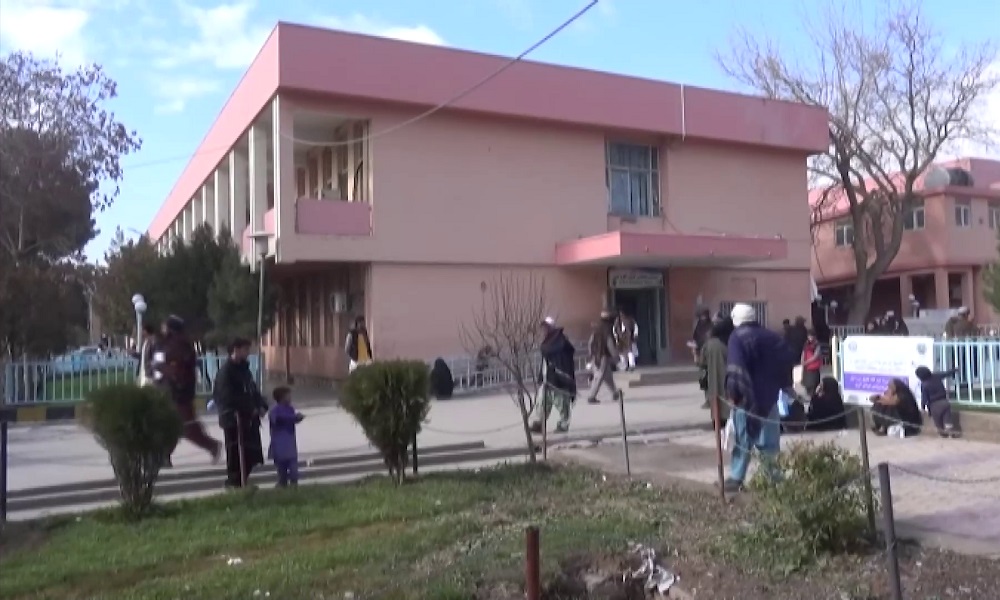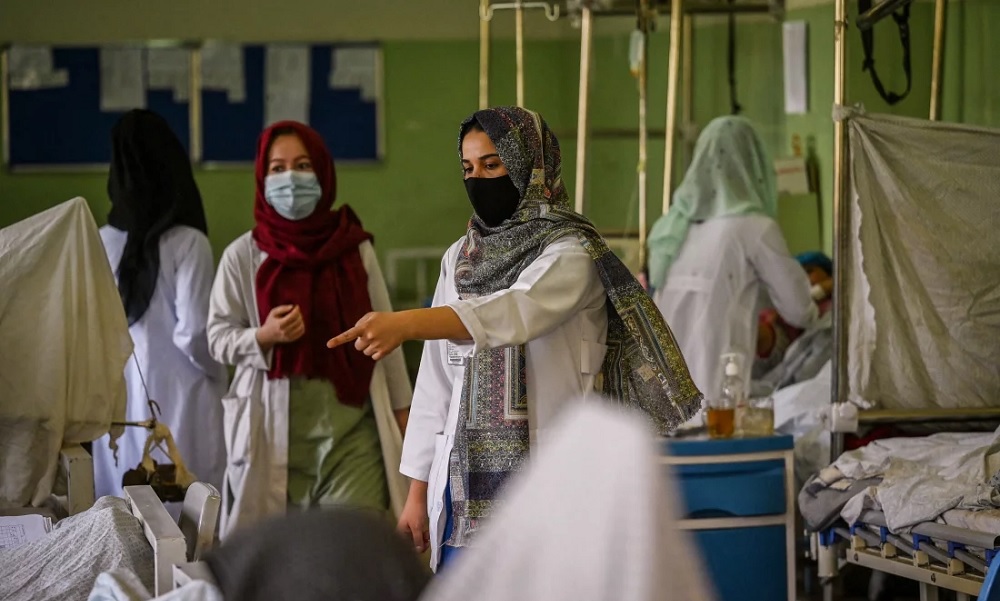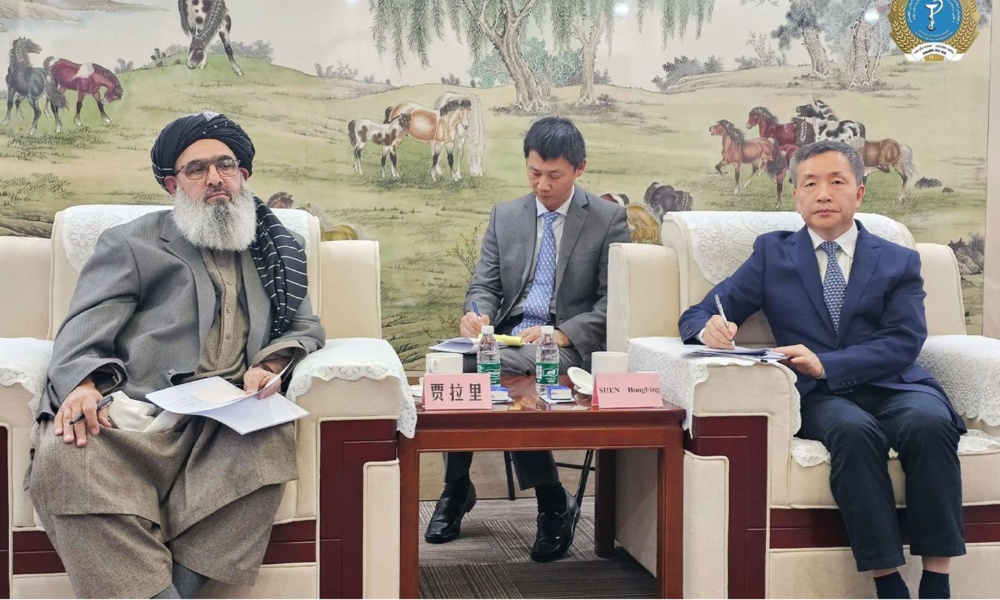Health
Afghans with TB ‘struggling’ to get accessible treatment: MSF

Afghanistan’s broken economy and dysfunctional health care system has left thousands of patients in a vulnerable situation across the country, especially people with tuberculosis (TB).
According to Doctors Without Borders/Médecins Sans Frontières (MSF) there is a critical shortage of advanced medical treatment available for TB patients, coupled with a widespread lack of knowledge about the disease.
One such example is Jawahira who was referred to MSF’s tuberculosis (TB) hospital in Kandahar earlier this year from a clinic in Daikundi, in central Afghanistan. “I used to visit private clinics, but instead of giving me TB medication, they usually just prescribed painkillers,” she said.
MSF’s 24-bed TB hospital in Kandahar is the only medical facility providing advanced TB care in southern Afghanistan. Many of the patients come from the nearby provinces of Helmand, Uruzgan, Nimroz and Zabul, but others travel from more than 500 kms away, from Farah, Daikundi, Badghis, Ghazni, and Paktika provinces.
“Our catchment area is so big, it is impossible to know exactly how many people are in it,” said MSF medical advisor Allieu Tommy. “Many travel from afar, and we support them by paying for transport costs, housing expenses, and food to alleviate some of the economic burden.” Without such incentives, most patients could not afford to come for treatment.
The cost of searching for treatment also took its toll on Jawahira. “My home is far away in Uruzgan, so when we went to see a doctor, I had to spend 6,000 Afghani ($67) for the car fare and then 13,000 ($146) for the drugs they gave me.”
The amount Jawahira spent on each visit to the doctor is about one-third of the average monthly income in Afghanistan. According to the World Bank, an estimated 60 percent of the country’s population is unemployed and has no income at all, exacerbated by sanctions and other financial measures against the Islamic Emirate of Afghanistan (IEA).
People often struggle to afford even basic food items, let alone travel expenses and medical fees for hospital visits. Meanwhile, the public health care system is under-resourced, under-staffed, and under-funded, MSF said.
The father of another patient at the Kandahar hospital, Hamdullah, said: “Our daughter Bibi is nine years old and has been sick since childhood, but we did not know of her illness — we had never heard the name TB before.”
MSF teams carry out regular health promotion activities in local communities in Kandahar to spread awareness about TB. They also provide information to patients and caretakers at the hospital in Kandahar.
“When a person arrives for the first time and learns that they have TB, we talk to them about what it is, how it’s transmitted, how to be careful around family members, and how long the treatment will take,” explained MSF nurse Taiba Azizi.
Providing this information is simple but effective. “Now I understand the symptoms and people back home know it is a dangerous disease,” said Hamdullah. “If somebody had seen her [Bibi] earlier, they would have said she would not recover. But now, we know she can get past this. She has already started to eat and walk. We hope she is getting better.”
MSF also tests a patient’s family for TB, as the disease is highly transmissible, particularly when people live close together.
MSF stated that some patients have a form of the disease that is resistant to conventional TB drugs and requires treatment that lasts nine to 12 months. This can be especially difficult to cope with during a hospital stay, far from friends and relatives. As a result, many patients stop their treatment early.
But next year, a six-month short course regimen will be rolled out that should make it easier for people to finish their treatment.
MSF has already set up a diagnose and treatment program that combines specialist inpatient care with supervised home-based treatment to help patients better cope with the regimens.
“What we offer is a system whereby a person spends the first 30 days in our facility under careful observation and, if they do not experience major adverse side effects from the drugs taken, they are discharged for homecare,” said Azizi.
“Our staff then do weekly follow-ups over the phone, so patients only need to come back to the hospital once a month to renew their medications and have an in-person consultation.”
Women and children are most vulnerable to TB
Over 70 percent of patients in MSF’s Kandahar TB hospital are women and children. “Women and children stay at home in dusty, poorly ventilated rooms for longer periods of time than men,” said Tommy.
“If a woman gets infected, the children are likely to catch the disease as well. Other cultural factors play a role too. Women whisper or speak in very low tones to one another, especially if men are in the room. Respiratory tract infections are then easily transmissible due to their proximity.”
An additional challenge for female patients is that they are generally required to be accompanied by a male family member to the hospital, and this coupled with the economic barriers can significantly reduce their access to health care.
It is estimated that TB and its resistant forms kill more than 13,000 people in Afghanistan every year.
Access to proper care remains a major challenge for patients in the southern part of the country, mainly due to insufficient medical infrastructure, length of treatment, and financial obstacles. While MSF’s TB hospital in Kandahar provides free quality treatment for many, the people of Afghanistan need a more robust and sustainable health care system to meet their many urgent needs, MSF stated.
Health
Herat Regional Hospital struggling to deal with heavy patient load

Herat Regional Hospital has a capacity to treat about 1,000 patients a day, 650 as in-patients. However, the hospital is being stretched to its limits and is treating more than double this number of people every day, hospital officials say.
Officials say that in most wards, there are two patients per bed. They say the hospital needs to expand - that they urgently need more space and more equipment.
According to doctors, the High Care Unit has only 10 beds, when it actually needs at least 65. In addition, they say the dialysis department is only running at half-mast. It has 17 dialysis machines, but only eight are in working order.
Herat residents have also raised concern over the state of the hospital and said some departments, especially the dialysis unit and pediatrics urgently need equipment and additional space.
Afghanistan is grappling with significant health challenges marked by a fragile healthcare system and unequal access to services, particularly in rural areas.
This is due to a number of issues such as transportation difficulties, shortage of healthcare professionals, and limited access to quality healthcare services.
Despite efforts to improve the country’s healthcare infrastructure, Afghanistan continues to grapple with systemic issues that hinder effective healthcare delivery. Analysis by UN agencies of under-served areas shows that 13.2 million people in 34 provinces reside in areas where primary healthcare services are not accessible within a one-hour walking distance.
Health
Excluding Afghan women from medical institutes threatens the future of health care in the country: MSF

The Islamic Emirate of Afghanistan’s (IEA) decision to bar women from studying in medical institutes will have far-reaching consequences for women’s health in the country, Médecins Sans Frontières (Doctors Without Borders) said on Friday.
This is another stage in the removal of women from public and professional life in Afghanistan. Already, there is an insufficient number of female health care workers in the country, impacting the availability of health care, especially given the separation of hospital wards by gender. New constraints will further restrict access to quality health care and pose serious dangers to its availability in the future, MSF said in a statement.
“There is no health care system without educated female health practitioners,” said Mickael Le Paih, MSF’s country representative in Afghanistan. “At MSF, more than 50 percent of our medical staff are women. The decision to bar women from studying at medical institutes will further exclude them from both education and the impartial provision of health care.”
The medical needs in Afghanistan are huge, and more female Afghan medical staff need to be trained to address them. For this to happen, women need to have access to education. Education restrictions for women and girls put in place in 2024, 2022, and 2021 considerably reduce the number of female medical staff in the future, MSF said.
“If no girls can attend secondary school, and no women can attend university or medical institutes, where will the female health professionals of the future come from and who will attend to Afghan women when they are at their most vulnerable?” said Le Paih. “For essential services to be available to all genders, they must be delivered by all genders.”
Recently, there have been reports that the leader of the Islamic Emirate has ordered the closure of medical institutes to women. The Islamic Emirate has not yet officially commented on this matter.
Health
Afghanistan’s health minister visits disease control center during China visit
Jalali, in China for the World Conference on Traditional Medicine 2024, said that traditional medicine in Afghanistan needs to be regulated and integrated into modern healthcare practices

Afghanistan’s Acting Minister of Public Health has held in depth discussions on managing diseases such as malaria, tuberculosis, and polio with China’s Deputy Director for Disease Control and Prevention, Shen Hongbing.
On an official visit to China, Mawlawi Noor Jalal Jalali also discussed other issues, with Shen and other officials, such as monitoring of diseases, disaster management processes and capacity building for Afghan healthcare workers.
Jalali, who was in China for the World Conference on Traditional Medicine 2024, also toured China’s Disease Control and Prevention Center (CDC) and its National Influenza Center.
The conference, which was held on Tuesday and Wednesday in Beijing, was jointly held by the World Health Organization (WHO) and Chinese sponsors, including China’s National Health Commission.
The opening ceremony of the two-day event was attended by health officials of governments and international organizations, experts and scholars, and deputies from medical institutions.
WHO Director-General Tedros Adhanom Ghebreyesus gave a speech via video.
Addressing delegates at the conference, the ministry cited Jalali as having said that traditional medicine in Afghanistan needs to be regulated and integrated into modern healthcare practices.
He also advocated for strengthened bilateral cooperation between China and Afghanistan to enhance capacity building, experience sharing, and joint research in the sector.
Afghanistan’s health ministry has meanwhile established a Traditional Medicine Department which is currently tasked with formulating policies and guidelines to regulate and improve this sector.
-

 Latest News5 days ago
Latest News5 days agoIndia hoping to import coal and marble from Afghanistan
-

 Sport4 days ago
Sport4 days agoZimbabwe’s opening ODI against Afghanistan abandoned
-

 Latest News5 days ago
Latest News5 days agoJapan announces $27.5 million aid package to Afghanistan
-

 Latest News1 day ago
Latest News1 day agoAfghan men must stand with women to support viable future of country: US envoy
-

 World3 days ago
World3 days agoNorth Korean troops suffer 100 deaths, struggling in drone warfare, South Korea says
-

 Latest News3 days ago
Latest News3 days agoTwo horror accidents on Kabul-Kandahar highway leave 52 dead
-

 International Sports4 days ago
International Sports4 days agoLanka T10: Kandy Bolts in at 4th spot in playoffs after thrilling day
-

 Sport3 days ago
Sport3 days agoAfghanistan crush Zimbabwe by 232 runs in second ODI
























